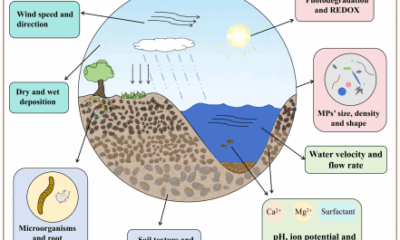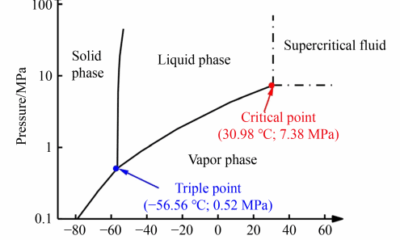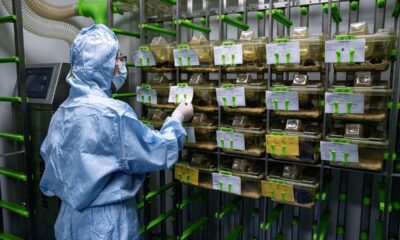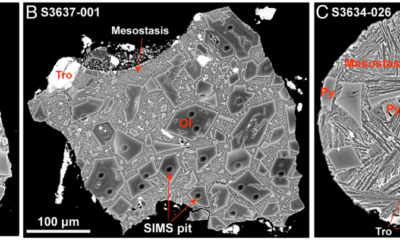Science
Researchers Uncover Key Enzyme in Hops for Beer Flavoring
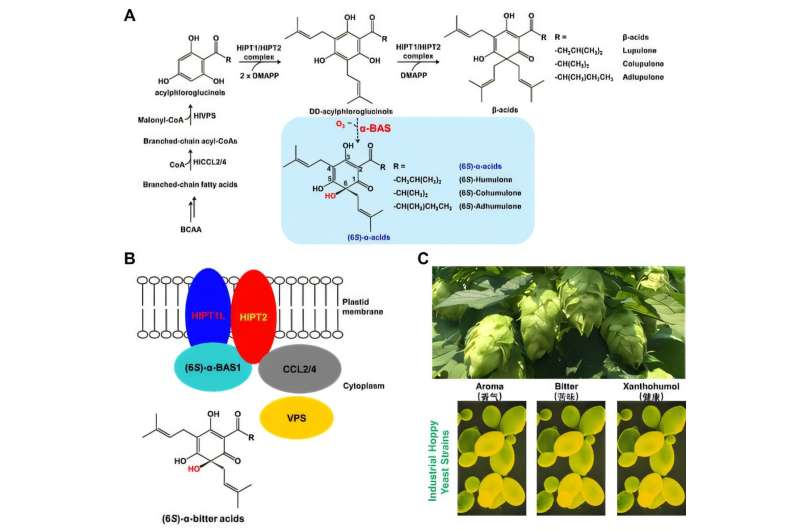
Hops have been identified as a crucial ingredient in beer production, playing a significant role in determining its flavor and quality. A recent study led by Prof. Wang Guodong from the Chinese Academy of Sciences has made a breakthrough in understanding the biosynthesis of α-bitter acids, compounds responsible for the characteristic bitterness of beer. This research, published in the journal Plant Communications on November 5, 2025, provides valuable insights that could enhance brewing practices globally.
Hops are the female flowers of the plant species *Humulus lupulus*, which contain glandular trichomes that synthesize various specialized metabolites. Among these, terpenes contribute to aroma, while xanthohumol possesses antioxidant properties beneficial for human health. Historically, α-bitter acids also acted as natural preservatives, improving the shelf life of beer long before the advent of modern techniques.
Despite the established biosynthetic pathway of α-bitter acids, the specific enzyme responsible for their final synthesis, known as α-bitter acid synthase (α-BAS), had remained unverified for over ten years. The research team faced challenges due to spontaneous oxidation of the precursor, deoxy-α-bitter acid, which produced a racemic mixture that complicated the identification of the enzyme’s function.
To tackle this issue, the researchers developed a sensitive liquid chromatography–mass spectrometry (LC–MS) detection method to differentiate the two chiral forms of α-bitter acids: 6S and 6R. Their analysis indicated that the glandular trichomes of hops predominantly store the 6S form.
In the course of their research, the team established a yeast heterologous expression system to explore over ten candidate genes related to α-BAS. Their findings pinpointed HlMO18 as the enzyme that specifically catalyzes the conversion of deoxy-α-bitter acid into the 6S form. This discovery was crucial, as it elucidated the intricate mechanisms behind the production of these important flavor compounds.
Further investigations revealed that the 6S-type α-bitter acid synthase forms a metabolic complex with upstream enzymes, which explains the selective accumulation of the 6S form in hop glandular trichomes. This research completes the biosynthetic map of α-bitter acids and enhances understanding of the three primary flavor compounds found in hops.
Looking ahead, the research team aims to leverage synthetic biology to engineer industrial yeast strains capable of producing “hoppy beer” that retains authentic hop flavors without the need for hop plants. This innovative approach could significantly reduce production costs and allow for the creation of customized, flavor-rich beers, marking a new frontier for the brewing industry.
This exploration into the biochemical pathways of hops not only advances scientific understanding but also positions the brewing industry for future innovations. The findings underscore the potential for continued research in agricultural biotechnology and its applications in food science.
For more details, refer to the original study: Chengyong Feng et al, “A flavin-dependent monooxygenase favors the formation of (6S)-α-bitter acids in hop glandular trichomes,” Plant Communications, DOI: 10.1016/j.xplc.2025.101528.
-

 Technology5 months ago
Technology5 months agoDiscover the Top 10 Calorie Counting Apps of 2025
-

 Technology2 weeks ago
Technology2 weeks agoOpenAI to Implement Age Verification for ChatGPT by December 2025
-

 Health3 months ago
Health3 months agoBella Hadid Shares Health Update After Treatment for Lyme Disease
-

 Health3 months ago
Health3 months agoAnalysts Project Stronger Growth for Apple’s iPhone 17 Lineup
-

 Health3 months ago
Health3 months agoErin Bates Shares Recovery Update Following Sepsis Complications
-

 Technology5 months ago
Technology5 months agoDiscover How to Reverse Image Search Using ChatGPT Effortlessly
-

 Technology3 months ago
Technology3 months agoElectric Moto Influencer Surronster Arrested in Tijuana
-

 Technology2 months ago
Technology2 months agoDiscover 2025’s Top GPUs for Exceptional 4K Gaming Performance
-

 Technology5 months ago
Technology5 months agoMeta Initiates $60B AI Data Center Expansion, Starting in Ohio
-

 Technology5 months ago
Technology5 months agoRecovering a Suspended TikTok Account: A Step-by-Step Guide
-

 Health5 months ago
Health5 months agoTested: Rab Firewall Mountain Jacket Survives Harsh Conditions
-

 Lifestyle5 months ago
Lifestyle5 months agoBelton Family Reunites After Daughter Survives Hill Country Floods



